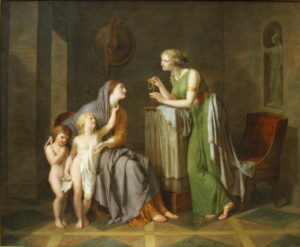Cornelia Rudloff-Schäffer is about to leave the German Patent and Trademark Office whose President she has been for 14 years. On 31 January 2023 she will enter into her well-deserved retirement. This should not remain unnoticed on this blog, even though others are more qualified to praise her merits and appraise the GPTO’s achievements during her tenure as President of the largest national patent office in the EU. As it is customary, Mrs. Rudloff-Schäffer will probably have to endure quite a number of more or less exciting, but certainly benevolent farewell speeches on her last day. I hope there will also be cake.
The farewell of an incumbent President and the adventure of a new one, Eva Schewior in this case (welcome!), gives rise to some thoughts about the role that such a President should primarily have and the attitude with which he or she should fill out this role. It just so happens that both role and attitude are almost perfectly summarized by and incorporated in one single name: Cornelia Rudloff-Schäffer. Here is why.
Wikipedia, useful as ever, tells us something about the origin and meaning of the name Rudloff. According to this source, which links to the Deutsche Namenslexikon 1990, “Rudloff” is derived from the name Rudolf by metathesis. It combines the Old High German words “hruod” (meaning “honor” or “glory”) and “wolf” (meaning “wolf”). In other words, Rudloff is the “Ehrenwolf” (honorary wolf), i.e. somebody who is able and willing to take and award honors, but also to show teeth, where necessary. The honorary wolf would never eat sheep, he or she would rather shepherd their flock.
This is further endorsed by the name “Schäffer“, which is probably just a slight misspelling of the German word and popular name “Schäfer” (shepherd). Both the Ehrenwolf and the Schäfer clearly allude to the primary role which a President has: The one as the Chief Shepherd of his employees, in particular the examiners. It is a role that requires both leadership – the flock of sheep must know where to graze – and the ability and willingness to protect and support them.
Which brings us to the (right) attitude how such a role should be filled out. This is symbolized by Cornelia, the second daughter of Publius Cornelius Scipio Africanus and mother of the Gracchi, shown here in a painting by Friedrich Hetsch.
The famous story depicted here is derived from an anecdote related by Valerius Maximus in his Factorum ac dictorum memorabilium libri IX (IV, 4, incipit), which demonstrates Cornelia’s devotion to and admiration for her sons. A rich neighbor came to visit Cornelia. She showed her jewelry, boasted about the wealth of her family (more than 2 billion EUR in modern currency) and her domus aurea splendidly located the 10th floor of her building, of which the only problem was occasionally too much snow on its canopies. Then she questioned Cornelia about her modest mode of dress and personal adornment, which was far more simple and understated than was usual for a Roman woman of her rank and status. Cornelia pointed to her two sons and said,
haec ornamenta mea [sunt], i.e., “These are my jewels.”
Indeed, a patent office does not have any better ornaments than its staff. This is the lesson to be learned from Cornelia, for which we should be grateful.
_____________________________
To make sure you do not miss out on regular updates from the Kluwer Patent Blog, please subscribe here.
Kluwer IP Law
The 2022 Future Ready Lawyer survey showed that 79% of lawyers think that the importance of legal technology will increase for next year. With Kluwer IP Law you can navigate the increasingly global practice of IP law with specialized, local and cross-border information and tools from every preferred location. Are you, as an IP professional, ready for the future?
Learn how Kluwer IP Law can support you.




*stands up and applaudes*
That is the best farewell I’ve heard and read so far.
May your words be read, and may we all toast to the health of Ms Cornelia Rudloff-Schäffer.